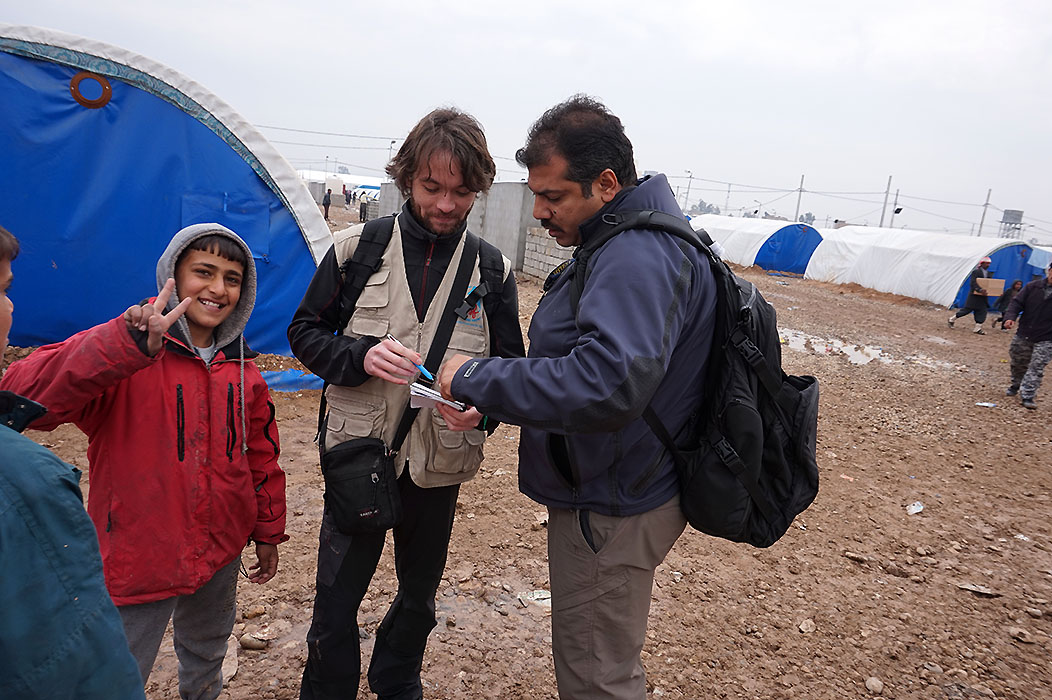Iraq Crisis : Mosul
Context: Conflict
Start date: 01/11/2016
End date: 10/07/2017
Areas of intervention: Nineveh Province
Activities:
- Support to coordination
- Telecoms expertise with ETC
- Telecom support to the medical sector
20 NGO beneficiaries
16,145 indirect IDP beneficiaries
3 IDP camps supported
660 GB of data for coordination and medical usage
Context
Since 2014, the north of Iraq has been under the grasp of the so-called Islamic State, with the city of Mosul as the group’s bastion in the country. The first offensive to reclaim the province of Nineveh and its capital, Mosul was launched in January 2015 by the Iraqi armed forces, supported by the Peshmerga and various militia groups. The assault to free Mosul commenced in October 2016, with the safety of the city's 1.5 million inhabitants at risk. Faced with this situation, the humanitarian community worked to set up IDP camps in the liberated zones surrounding Mosul in order to house the 700,000 people fleeing the city, but the state of the telecommunications caused several coordination problems.
Whilst the telecoms infrastructure suffered collateral damage because of the violent combats, many transmitter stations were intentionally sabotaged by IS soldiers in an attempt to slow down the progression of Iraqi armed forces and hinder coordination efforts in recaptured areas of the region.
Télécoms Sans Frontières deployed a team to Iraq in November 2016 in order to bridge the gap in communications whilst the repair of the terrestrial infrastructure was underway, ensuring that the humanitarian community had the necessary communications means to provide essential aid to families fleeing Mosul.
Support to coordination
The high demand in terms of humanitarian needs meant that effective coordination was vital in order to ensure that shelter, food and non-food items (NFIs) were transported to the various locations as and when required. However, the security risks and lack of communications meant that transmitting these needs to central warehouses in Erbil would depend on the capacity for humanitarian workers to travel. The communication of these needs could thus take several hours or days according to security conditions or travel authorisations.
In order to help catalyse conveyance of aid, TSF set up Wi-Fi alongside the United Nations Emergency Telecommunications Cluster (ETC) in the town of Qayyarah. A satellite internet connection was installed at a central point in the town, with Wi-Fi redistributed across several kilometres so as to reach the camps of Qayyarah Airstrip, Jad’ah and Haj Ali. The connectivity was installed by TSF to the benefit of the humanitarian organisations working in this high-risk zone, notably the UN Camp Coordination and Camp Management Cluster (CCCM).
The Wi-Fi allowed for enhanced coordination between Qayyarah, Erbil and Baghdad, help anticipate the arrival of families in the camps, and communicate securely via various online cross-communication apps, whilst reducing movement outside of camp confines and improving the security of humanitarian workers.
After the initial 3-month period, TSF handed over the management of the connection to the ETC who had the responsibility of ensuring a durable connectivity solution whilst the terrestrial network was under repair.
In total, the 20 beneficiary NGOs clocked up an average data transfer rate of 22GB per month to the benefit of the 16,145 families sheltered in Qayyarah Airstrip, Jad’ah and Haj Ali.
Telecom support to the medical sector
Site surveys in the region's camps unveiled gaps in the stability of the region’s mobile networks, with partial destruction of the terrestrial internet network. TSF brought its support of the medical sector in April 2017, and set up a new connection in the town of Hammam al-Alil to support medical staff working in the Médecins Sans Frontières Belgium's emergency trauma hospital. A vital medical facility at the heart of the disaster zone, the trauma centre treats the conflict’s most severe cases and provides immediate life-saving or damage control surgery.
Since its set-up, the trauma facility has saved over 3,100 lives, 56% of which were women and young children. With an average data transfer rate of 180 GB per month, the connection galvanises coordination between the numerous field hospitals of the region and facilitates the communication between logisticians and doctors working to save the lives of the injured.


















